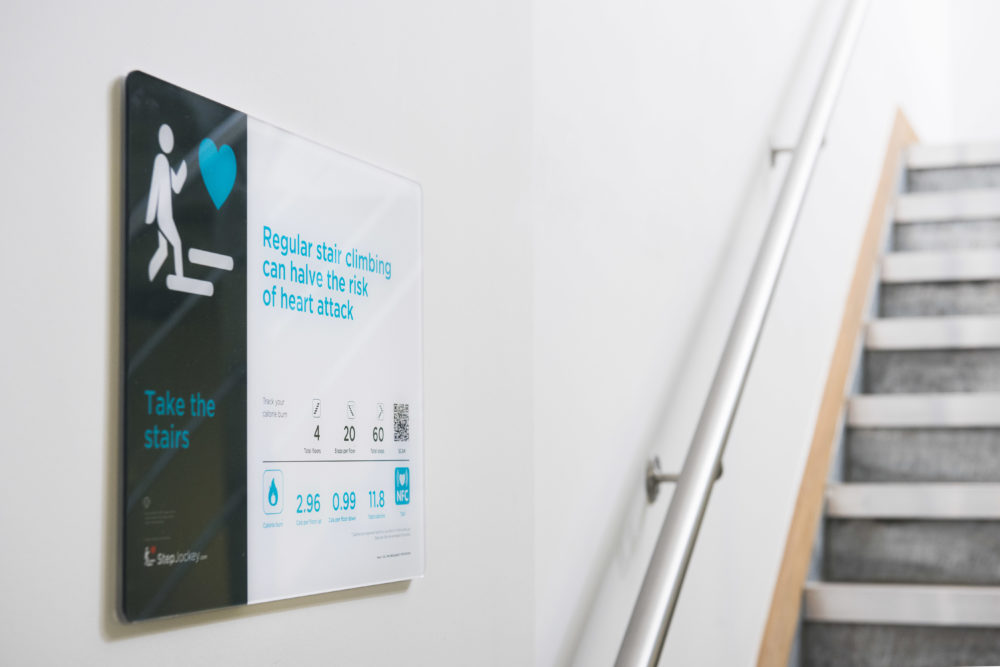Founded in 2013, StepJockey is a wellness programme that seeks to encourage employees in multi-storey workplaces to be more active and productive. Here, we talk to the company’s CEO, former private equity investment director Zarir Vakil about the company’s growth plans.
What does StepJockey do?
Our proprietary smart-sign and gamification technology is used by employers to combat sedentary behaviour in the workplace by encouraging stair use. It allows all staff to seamlessly build exercise and anti-sedentary activity into their normal working week without disruption to the business.
We’ve been backed by the UK Department of Health via Innovate UK and are fully compliant with the new international Delos Well Building Standard, and work for the whole office, not just the fit/sporty. It’s non-disruptive, allowing movement to be incorporated into the working day, and highly visible, helping to embed a culture of health within offices, significant time and energy savings in addition to health benefits.
Before StepJockey I’ve worked as board adviser, director and non-exec director for around ten years. Prior to that I was a private equity investment director, former private banker and commercial director.
Over the years, I’ve managed change and transformation across several organisations, integrating all stakeholders and at the same time generated sales growth and expanded market share by building strong teams.
Using my experience as an SME and private equity investment director, I provide consultancy and leadership, to develop businesses, manage change and transformation programmes, and advise and execute on business performance improvement to create shareholder value.
How did you get the idea, and what opportunity did you see when you started the business?
My primary task is leading the company into its new stage post-founder. Our mission is to make office buildings a healthier place and together with my team, we’re developing a cost effective and impactful corporate wellness initiative that can easily be implemented into any work environment.
Having delivered a board advisory report to the business last summer, I was then invited to undertake the challenge of executing what I was recommending and that led me to becoming StepJockey’s CEO.
My vision for the business drew upon the experiences I’d had during my time with other organisations, but most notably on my specialist background with small fast-growth businesses and in HR and change and transition. Much of my time so far at StepJockey has been driving the company in a new direction; away from being a ‘utility contractor’ and towards being a professional services firm.
Our system’s used in over 15,000 buildings around the world by clients including Disney, Pearson, JLL, UBS, Channel 4 and NBC.
How did you finance it?
We were initially funded by the UK Department of Health via Innovate UK. On top of that we’ve received investment from private shareholders and venture capital companies.
These backers recognise we have something unique, which is needed, and that we’re driven by a team of dedicated people who really want to get it right and make an impactful change in society.
What were your key marketing strategies?
Our key marketing strategies were, first of all, repositioning the company so that it wasn’t perceived as a utility contracting organisation, but rather towards being a professional services firm.
What we’re also focusing on is lead generation; this includes looking at the usual things like electronic direct mailers, organic search and PPC, a website refresh, PR, and so on. I’m drawn towards the work of [management consultant and organisational theorist] Geoffrey Moore and his teachings in ‘Crossing the Chasm’ [focusing on marketing high-tech products] which I first came across several years ago, and resonates strongly for StepJockey.
The reason this is important to me is because it can be very dangerous assuming the lessons the technology sector has learned in the last 20 years are not applicable in other businesses such as ours. Although we have an app, I don’t necessarily identify StepJockey as a technology company; we’re more a professional service firm.
But we can learn the lessons of why marketing might have to be different in the early adoption market; both in terms of fundraising and – most importantly – landing new clients.
What is the revenue stream?
We monetise by selling the smart signage required for our system to integrate with our app. These are strategically positioned using behavioural economics (‘nudge theory’) next to the stairs in any workplace. These are smart signs are NFC and QR coded and can be scanned by Google, Android and iPhones for workplace occupiers to then start the gamified stair-climbing programme challenges which we also charge for. The app however is freely available on the App store.
What are the main challenges you have experienced so far?
The primary challenges as it stands is to continue developing new business leads to drive the company into its next phase, while reaching enough people – quickly – so they can learn about the work we’re doing.







